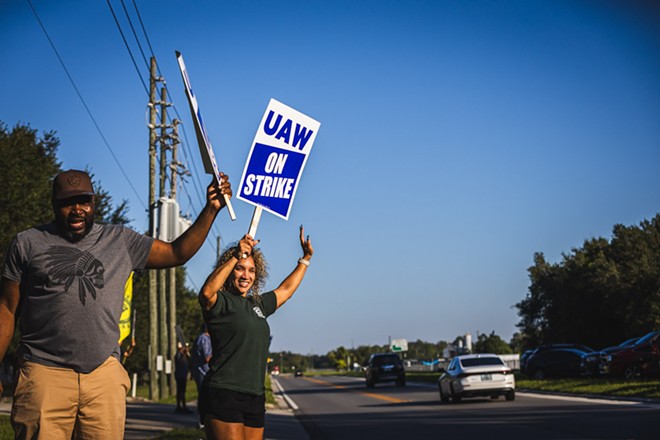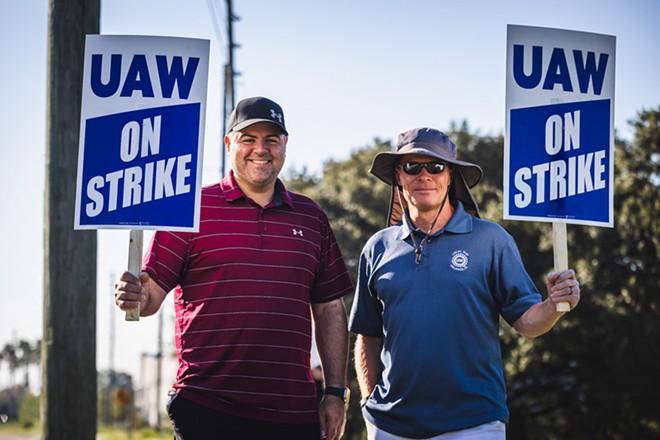
Ford, another major automaker, reached a similar agreement with the UAW last Wednesday, while General Motors — the lone holdout of the so-called Big Three auto companies — reached a deal with the union Monday, less than 48 hours after nearly 4,000 unionized workers walked out of GM’s largest North American plant in Spring Hill, Tennessee.
“We have achieved what just weeks ago we were told was impossible,” said UAW president Shawn Fain, speaking to the public in a live-streamed update Saturday. “At Stellantis in particular, we have not only secured a record contract, we have begun to turn the tide in the war on the American working class,” he continued. “And we are truly saving the American dream.”
“We have not only secured a record contract, we have begun to turn the tide in the war on the American working class”
tweet this
All three tentative agreements are still subject to final approval from union members. Although finer details are still being rolled out, the contracts appear to provide major gains that were only offered up by the Big Three auto manufacturers after thousands of their employees had walked off the job, following the expiration of previous union contracts on Sept. 15.
The deal reached with Jeep maker Stellantis, which owns a parts depot in Orlando, includes the addition of 5,000 new jobs, the reopening of an assembly plant in Illinois, and a 25% increase to base pay for workers (or about 30% with cost of living adjustments factored in) over the life of the four-and-a-half-year contract.
If approved by union members, the deal would provide an immediate 11% wage increase upon ratification, which is nearly equal to all wage increases workers received from contracts negotiated under different union leadership since 2007 combined, according to the union.
The starting wage for union employees of Stellantis, a company that reported $12 billion in net profits in the first six months of this year alone, would exceed $30 an hour by the end of contract. The top wage would reach about $42 an hour, up from the current $32.
The agreement reached Saturday affects about 77 union employees of Stellantis at an auto parts center in Orlando, out of 43,000 workers total nationwide.
Finer details of the agreement haven’t yet been shared publicly.
But, according to the union, major highlights include:
Wages: The agreement includes total wage increases of about 30%, more than double Stellantis' initial offer of 14.5%. The starting wage for workers under the deal would increase 67% with COLA factored in, and the top wage would increase 33%. Some lower-tier members at MOPAR would see an immediate 76% raise upon ratification.
COLA: The union won the restoration of cost-of-living adjustments that workers gave up in 2009 to help ensure their employer's survival during the Great Recession.
Temporary workers: Current temporary workers, who have historically been paid at a lower rate, will get a 168% raise over the life of the contract. All new workers are hired on as temps and can spend years on temporary status before having the chance to apply for a permanent position, workers have said. This left them with worse pay and fewer job benefits than their coworkers, creating space for division in the workforce. Under the tentative deal, no one would remain a temp for more than nine months after ratification.
Right to strike: The agreement gives workers the right to strike over plant closures, and the right to strike over product and investment. “That means if the company goes back on their word on any of these plants, we can strike the hell out of them,” Fain explained.
Wage progression and tiers: The union won back a three-year wage progression, so it takes fewer years to reach the top of the wage scale, and killed divisive wage tiers that left newer workers on a lower pay scale.
Reopened factory: Stellantis agreed to restart a factory in Belvidere, Illinois — idle since February — that had put 1,200 workers out of jobs, the union said. The automaker will also add a battery plant in Belvidere that will employ more than 1,000 people.
New jobs: The union shared Saturday that Stellantis had threatened to cut 5,000 jobs going into contract negotiations. At least two facilities — a machining plant in Toledo and an engine plant in Trenton, Michigan — had been at risk. Under the new agreement, Stellantis will instead add 5,000 new jobs, the union shared.
All in all, the value of Stellantis' offer increased 103% over the course of their strike, according to the union, demonstrating that the company clearly had more to give, despite at times pleading poverty when asked by reporters about the union's demands.
Few details so far have been released on how the Stellantis agreement will affect certain issues brought up during negotiations, such as retirement benefits, the future of electric vehicle manufacturing, and a shorter work-week. Union leadership is expected to provide a more detailed breakdown on Thursday.
If a majority of workers reject the deal, they’ll return to the picket line. Dates for the voting period are TBA.
Representatives of UAW Local 1649, representing Stellantis workers in Orlando, did not immediately respond to requests for comment from Orlando Weekly on the proposed contract. Dwight Brubaker, secretary-treasurer for Local 1649 referred Orlando Weekly to UAW president Shawn Fain’s live-streamed announcement. Local 1649 president Bernard Stewart did not respond to a text message seeking comment.
Workers in Orlando first walked off the job on Sept. 22, one week after thousands of their fellow union members had shut down three plants in Ohio, Missouri, and Michigan.Stellantis workers at a parts depot in Orlando, Florida organized with the @UAW have walked off the job, joining 37 other GM and Stellantis parts depots and three GM, Ford, and Stellantis plants in the Midwest on #strike pic.twitter.com/iSqzAioT55
— McKenna Schueler (@SheCarriesOn) September 22, 2023
Since then, they’ve been joined on the picket line by politicians, UAW retirees, and by union members across various sectors of the economy traveling from as far as Miami — from union nurses to striking actors, Disney World workers, teachers, fast food workers and UPS workers.
Striking auto workers told Orlando Weekly they also received general support from the public, from food and water donations to honks of support from drivers on the road.“There are people driving up and down the road that don’t really know what a union is,” admitted Ron Stone, a longtime worker who transferred to the Orlando parts depot twenty years ago from Indiana, after a Chrysler plant he worked at there was bought out. “But they know it’s about making lives better and ending corporate greed.”
Stone isn't the only transfer — far from it. Several striking auto workers Orlando Weekly met on the picket line over the last month transferred to Florida from places like New Castle, Indiana, as well as Belvidere, Illinois, after plants were bought out or shuttered.
The Belvidere Assembly Plant, which saw mass layoffs two years ago during an earlier downsizing, has sat idle since February. On Saturday, UAW vice president Rich Boyer said that, under the new agreement, UAW members from Belvidere who have been scattered across the country will have the right to return and reclaim their old positions.
“We’ve done the impossible,” said Fain, of that achievement. “We have moved mountains.”
U.S Representative Bill Foster (D-IL), who represents Belvidere, described it as “a cause for celebration for Belvidere and the generations of workers who made their careers at the Assembly Plant.”
Kalilah Austin, a mother of two, was one of the workers who took an opportunity to transfer from the Belvidere Assembly Plant to Orlando a couple of years ago as they were downsizing. “They want people to move their lives for them,” said Austin of her employer, during workers’ first weekend on the picket line.
“I work my butt off for this company — blood, sweat and tears,” she said. She makes top pay, but with Orlando's high rents and cost of living, expenses add up. But it's not all about pay, nor it about personal greed. “I just want to be able to have stability, financial flexibility and stability, and not have to work 60, 70 hours [per week] to get there.”A Chrysler worker of 12 years, she also strongly supported the end of wage tiers, particularly the tier that keeps temporary workers lagging behind on pay and benefits.
This fight of the UAW is “pivotal,” Austin told Orlando Weekly that first week. “You've gotta use that word.”
Ford, another one of the Big Three auto companies, reached its own tentative agreement with the UAW last Wednesday, ending a strike that halted work at Ford’s big money-maker factory in Louisville, Kentucky as well as factories in Chicago and Wayne, Michigan.
The deal with Ford affects at least 42 workers at a parts depot center in Davenport, about an hour southwest of Orlando. Workers in Davenport continued to stay on the job over the duration of the strike, as part of the union’s staggered Stand Up Strike strategy.
Instead of directing all 150,000 union members of the Big Three automakers to walk off the job at once (after members voted to authorize a strike in August), the UAW chose to target specific locations, announcing new expansions of the strike over the course of the last six weeks.
This served as a tribute to the union’s militant sit-down strikes of the mid-1930s, which forced General Motors to recognize the union and bargain a contract. Chrysler and Ford later followed suit after thousands of workers organized in favor of unionization, forcing their hands.
“The Sit Down strike showed the incredible power of regular working class people to fight for economic justice and win big,” said union president Fain on Saturday. “I am honored to announce that our union is once again victorious.”
U.S. President Joe Biden, who visited a UAW picket line in Michigan last month, praised the Stellantis deal, calling it “a testament to the power of unions and collective bargaining to build strong middle-class jobs while helping our most iconic American companies thrive.”
Subscribe to Orlando Weekly newsletters.
Follow us: Apple News | Google News | NewsBreak | Reddit | Instagram | Facebook | Twitter | or sign up for our RSS Feed





















